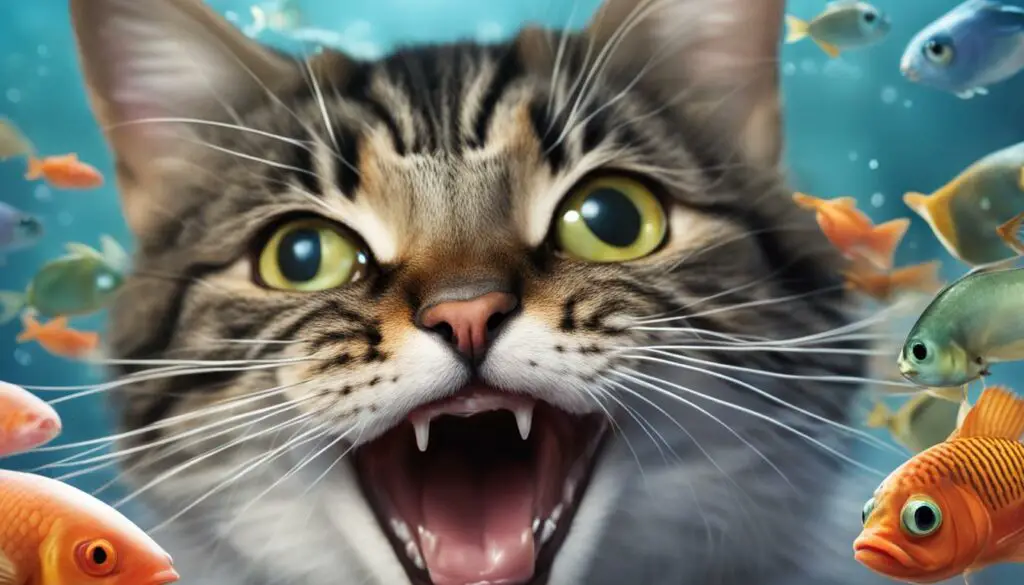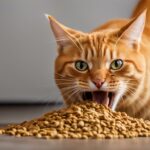Do you ever wonder why your beloved feline friend’s breath sometimes smells like fish? It can be a bit concerning, but there are several possible reasons why this might happen. Understanding the underlying causes can help you address the issue and ensure that your cat’s oral health is well-maintained.
Key Takeaways:
- The smell of fish coming from your cat’s breath can be caused by various factors such as diet, dental issues, and underlying health problems.
- Feeding your cat a balanced diet and avoiding “human food” can help prevent the buildup of tartar and dental plaque, which contributes to fishy breath.
- If your cat’s bad breath persists and has a strong fishy smell, it could be a sign of more serious conditions such as pharyngitis, gastritis, kidney failure, or mouth disease. Consult a veterinarian for proper diagnosis and treatment.
- Maintaining good overall cat hygiene, including grooming and cleaning their teeth regularly, can minimize breath odor.
- Brushing your cat’s teeth with cat-specific toothbrush and toothpaste is an effective way to combat fishy breath and prevent plaque and tartar buildup.
The Role of Food in Your Cat’s Breath Odor
When it comes to your cat’s breath, the key culprit behind that fishy smell could be their diet. Feeding your furry friend too much “human food” can lead to the buildup of tartar and dental plaque on their teeth, which in turn can cause bad breath. Just like in humans, bacteria thrive in the mouth when there is an accumulation of plaque, leading to an unpleasant odor. To prevent this issue, it’s important to be mindful of what you feed your cat.
Opting for a balanced and appropriate cat diet can significantly reduce the chances of bad breath. High-quality commercial cat food specifically formulated for their nutritional needs helps maintain good oral health. These diets often promote the removal of plaque and tartar, preventing the bacteria responsible for the fishy odor from thriving. Avoid feeding your cat excessive amounts of human food and opt for dental treats designed to promote oral hygiene instead.
Regular dental care, including brushing your cat’s teeth, can further combat bad breath caused by food. Brushing your cat’s teeth with a cat-friendly toothbrush and toothpaste helps remove plaque and tartar buildup, ensuring fresher breath. It’s recommended to brush their teeth two to three times a week to effectively reduce the presence of bacteria and maintain good oral hygiene.
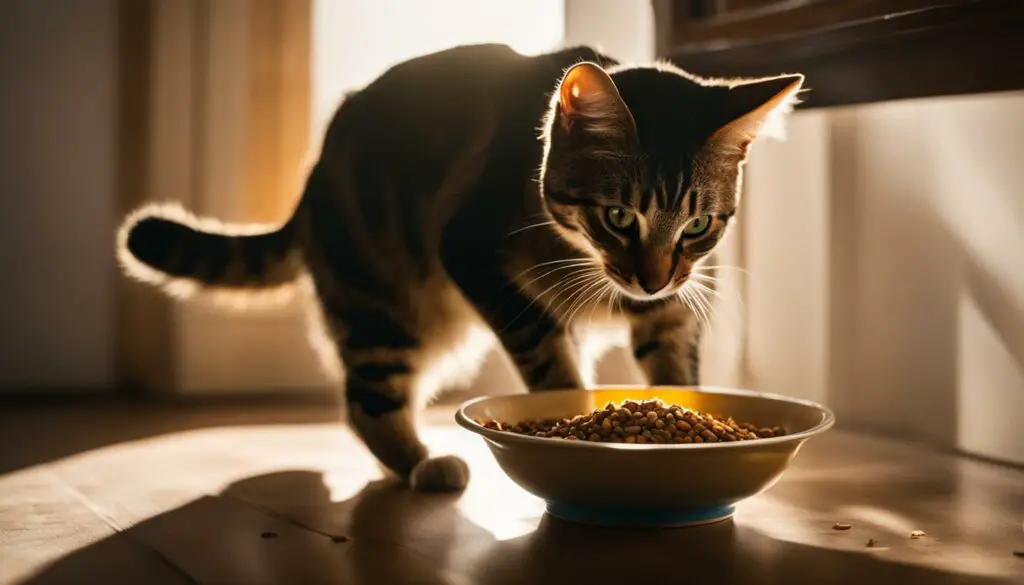
By being mindful of your cat’s diet and implementing proper dental care practices, you can keep their breath smelling fresh and their oral health in check.
Potential Diseases Associated with Fishy Breath
If your cat’s bad breath persists and has a strong fishy smell, it could be a sign of an underlying health problem. Conditions such as pharyngitis, gastritis, kidney failure, or mouth disease may be the cause. It is essential to consult with a veterinarian to identify and address any potential medical issues.
Signs and Symptoms of Potential Diseases
- Pharyngitis: Cats with pharyngitis may display symptoms such as difficulty swallowing, coughing, and increased salivation.
- Gastritis: Cats suffering from gastritis may experience vomiting, loss of appetite, and abdominal discomfort.
- Kidney Failure: Symptoms of kidney failure in cats include increased thirst, frequent urination, weight loss, and lethargy.
- Mouth Disease: Cats with oral health issues may exhibit symptoms such as drooling, pawing at the mouth, and reluctance to eat.
Early diagnosis and treatment of these conditions are crucial for your cat’s well-being. A veterinarian will be able to perform a thorough examination and recommend appropriate treatment options to alleviate your cat’s fishy breath and address any underlying health concerns.
Remember to provide your veterinarian with detailed information about your cat’s symptoms, their medical history, and any changes in behavior or appetite. This information will help the veterinarian make an accurate diagnosis and develop the most effective treatment plan.
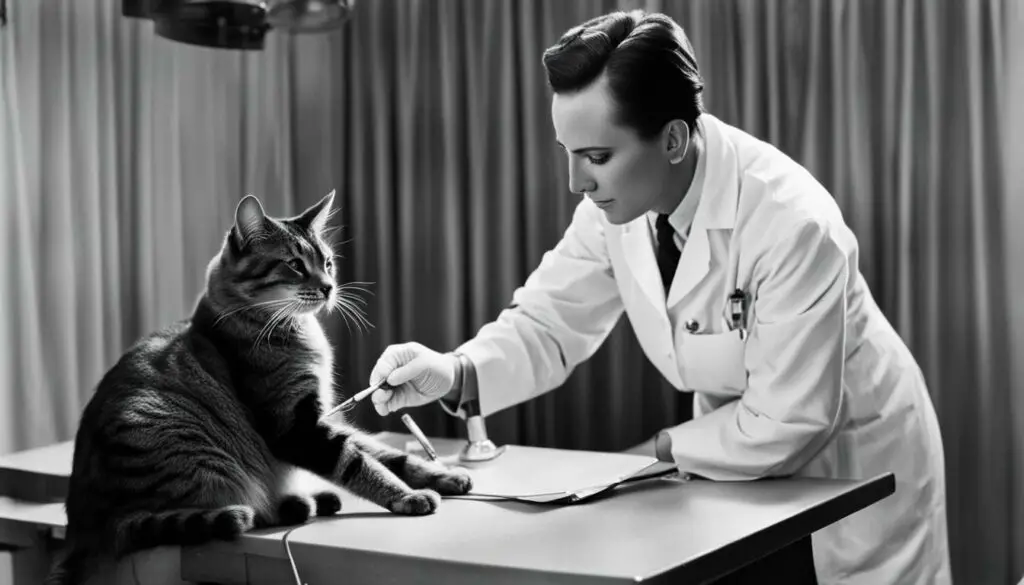
A healthy mouth is essential for your cat’s overall health and quality of life. Regular veterinary check-ups, proper dental care, and early intervention can help prevent and treat potential diseases associated with fishy breath. By prioritizing your feline friend’s oral hygiene, you can ensure they enjoy fresh breath and a happy, healthy life.
The Impact of Cat Hygiene on Breath Odor
When it comes to your cat’s breath odor, maintaining good hygiene is crucial. Cats are known for their extensive grooming behavior, which includes cleaning their entire bodies, including their anal area. While this thorough hygiene routine is essential for their overall well-being, it can result in a smoky smell when they open their mouths.
Cat grooming plays a significant role in their oral hygiene as well. Their tongues have small, barbed papillae that act as natural cleaning tools. When cats groom themselves, they remove food particles and bacteria from their fur, helping to keep their mouths clean. However, this grooming behavior can also lead to the production of volatile compounds that contribute to their breath odor.
Ensuring proper cat hygiene can minimize breath odor. Regularly brushing your cat’s fur can help remove excess hair and reduce the chances of bacterial buildup. Additionally, providing your cat with a healthy diet can promote good oral hygiene. Opting for high-quality cat food and providing fresh water regularly can help prevent dry mouth and promote fresher breath.
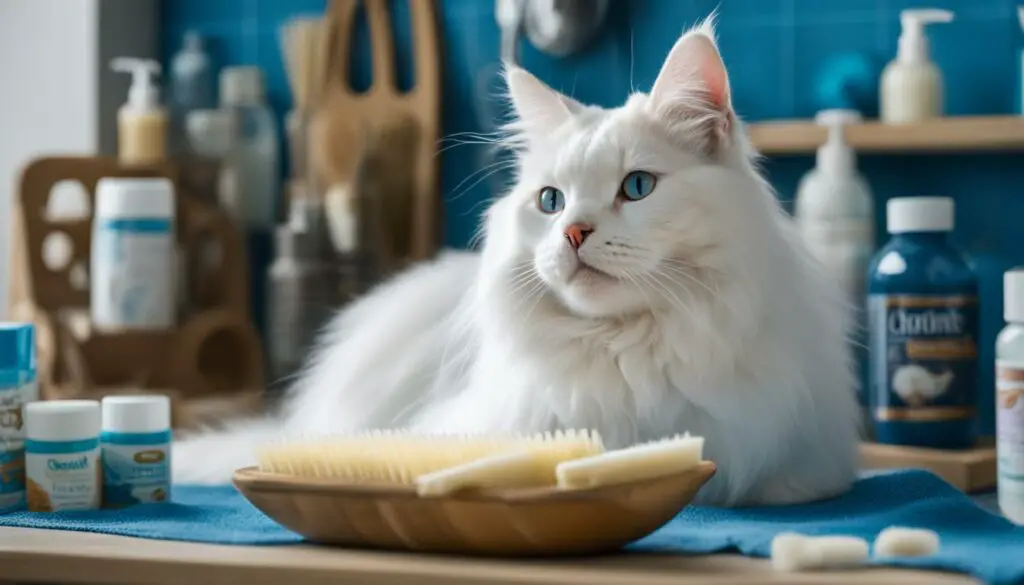
Understanding the Smoky Smell
“Cats are meticulous groomers, but their grooming routine can sometimes result in a smoky smell when they open their mouths.”
The smoky smell that cats may have when they open their mouths is a normal part of their grooming process. It is important to note that this smell is different from the strong fishy odor that may indicate an underlying health issue. If you notice any unusual or persistent changes in your cat’s breath odor, it is best to consult with a veterinarian to rule out any potential medical concerns.
The Importance of Toothbrushing for Fresh Breath
If you want to ensure your cat has fresh breath and maintains good oral health, regular toothbrushing is essential. Just like humans, cats can develop plaque and tartar on their teeth, which can lead to bad breath. By implementing a toothbrushing routine, you can prevent the buildup of bacteria and keep your cat’s breath smelling clean and fresh.
Toothbrushing should be done using a cat-specific toothbrush and toothpaste. It’s important to note that human toothpaste can be toxic to cats, so always opt for a toothpaste formulated specifically for feline oral care. Brushing your cat’s teeth at least twice a week is recommended to effectively remove plaque and tartar.
“Regular toothbrushing is the most effective way to combat fishy breath in cats.”
| Benefits of Toothbrushing for Cats |
|---|
| Removes plaque and tartar |
| Prevents bad breath |
| Promotes overall oral health |
| Reduces the risk of dental diseases |
When brushing your cat’s teeth, start slowly and be gentle to avoid causing any discomfort. Gradually increase the duration of each brushing session as your cat becomes more comfortable with the process. If your cat is resistant to toothbrushing, consult with your veterinarian for alternative dental care options such as dental wipes or oral rinses.
Remember, maintaining proper dental care for your cat is crucial not only for fresh breath but also for their overall health and well-being. Regular toothbrushing, along with professional dental cleanings and a balanced diet, will help ensure your furry friend’s mouth stays healthy and odor-free.
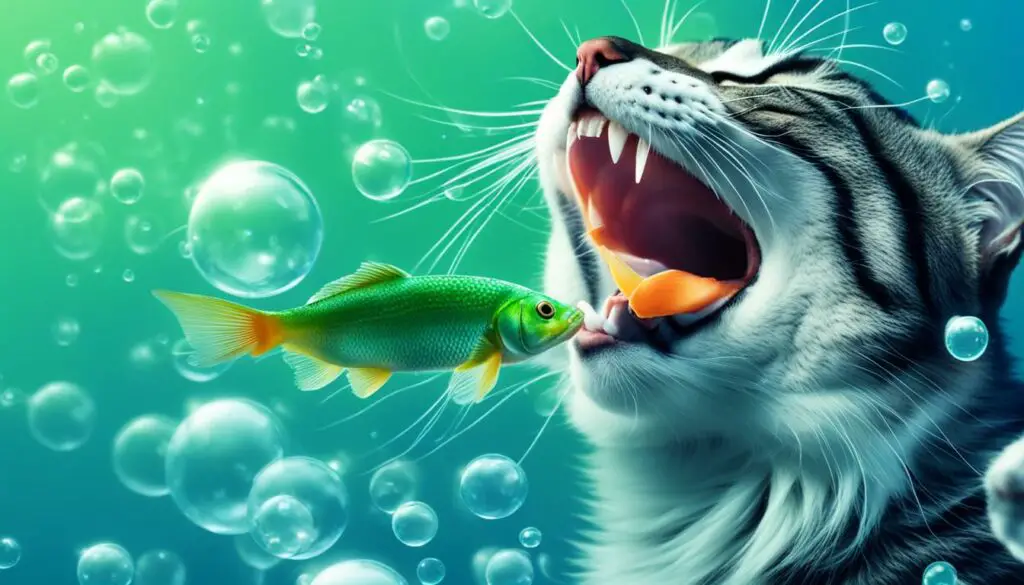
The Benefits of Dental Kibble and Chews
When it comes to maintaining your cat’s oral health, dental kibble and chews can provide significant benefits. These specially formulated products are designed to promote tartar control and improve breath odor through their unique chewing action.
Dental kibble, also known as dental cat food, has a texture that helps remove plaque and tartar buildup as your cat chews. The kibble’s abrasive texture helps scrape away bacteria and food particles from your cat’s teeth, reducing the risk of dental disease. Many dental kibbles also contain ingredients that freshen breath, leaving your cat’s mouth smelling fresher.
Dental chews, on the other hand, are treats that encourage longer chewing, which can help massage your cat’s gums and remove plaque. The chewing action stimulates saliva production, which has natural antibacterial properties and helps wash away bacteria that cause bad breath. Additionally, some dental chews are designed to have a helpful “brushing” effect on the teeth, further promoting oral hygiene.
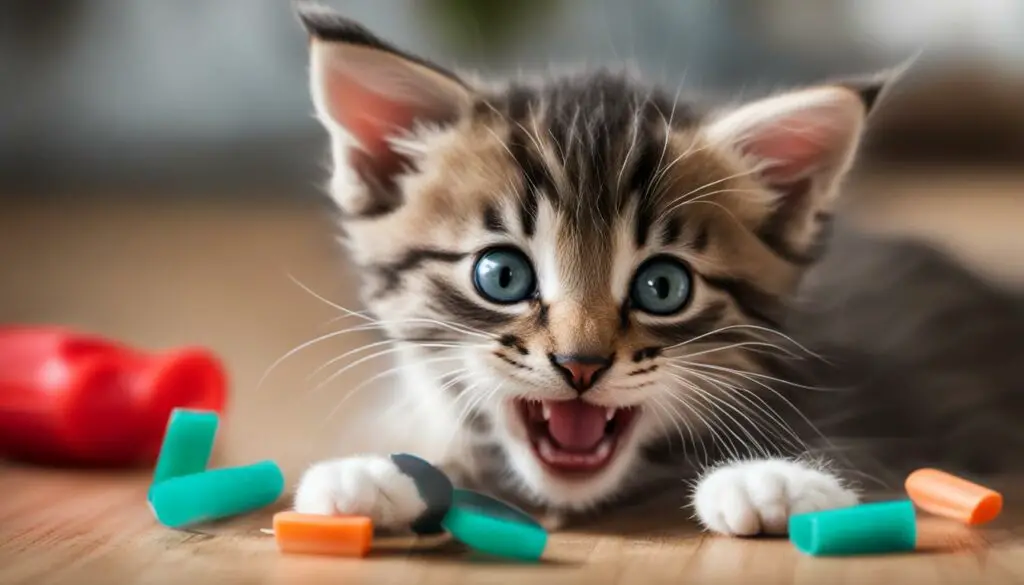
Introducing dental kibble and chews into your cat’s routine can be an easy and enjoyable way to improve their oral health. However, it’s important to consider your cat’s specific needs and dietary requirements before making any changes to their diet. Consult with your veterinarian to determine which dental products are most suitable for your cat, and ensure a smooth transition by gradually introducing them into your cat’s regular meals or treat time.
The Benefits of Using PlaqueOff to Freshen Your Cat’s Breath
If you’re looking for a convenient and effective solution to combat your cat’s fishy breath, consider using PlaqueOff. This specially designed product is formulated to fight tartar, plaque, and bad breath in cats. Available in a powder form, PlaqueOff can be easily added to your cat’s food, making it a simple and hassle-free way to improve their breath odor.
PlaqueOff works by supporting your cat’s oral health and preventing the buildup of tartar and plaque. By reducing the accumulation of these substances on their teeth, it helps combat the bacteria that can cause bad breath. Regular use of PlaqueOff can contribute to fresher breath and healthier gums, promoting overall oral well-being for your feline friend.
One of the advantages of using PlaqueOff is its ease of administration. Simply sprinkle the powder onto your cat’s food, and they can consume it without any hassle or resistance. This makes it an ideal option for cats that are uncooperative with toothbrushing or other oral hygiene practices. With PlaqueOff, you can provide your cat with the oral care they need in a way that works for both of you.
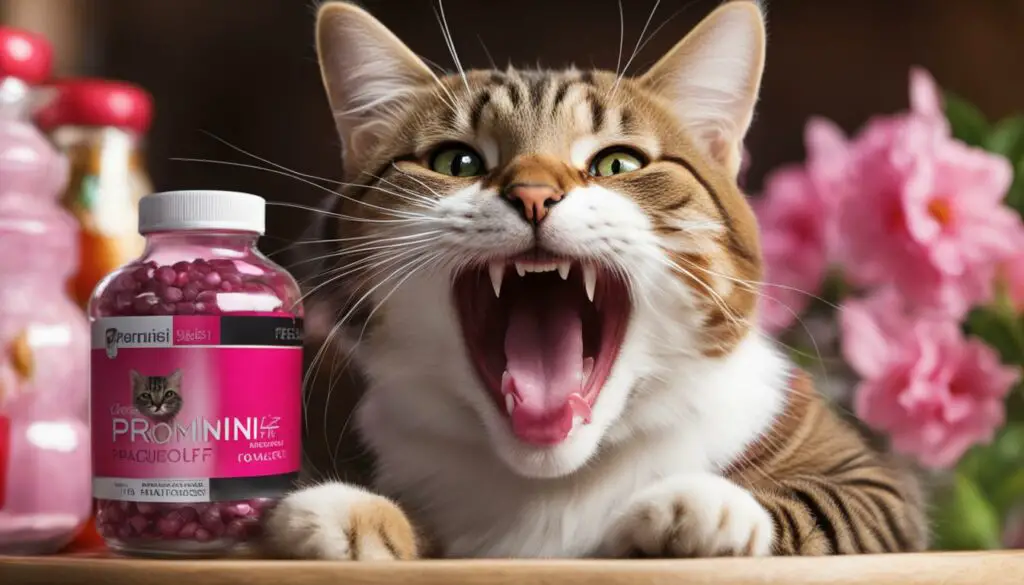
By incorporating PlaqueOff into your cat’s dental care routine, you can take proactive steps to prevent tartar buildup and maintain their oral health. Remember, it’s important to consult with your veterinarian before introducing any new products or making significant changes to your cat’s diet or dental care regimen. With the right approach and the help of PlaqueOff, you can help your cat enjoy fresher breath and a happier, healthier life.
The Benefits of Seeking Professional Dental Care for Your Cat
When it comes to addressing your cat’s persistent fishy breath, seeking professional dental care from a veterinarian can offer significant benefits. While implementing good oral hygiene practices at home is important, there are certain dental issues that may require the expertise and tools of a professional. Let’s explore the advantages of professional dental care for your feline companion.
Comprehensive Dental Cleaning and Tartar Removal
A veterinarian can perform a thorough dental cleaning for your cat, ensuring the removal of stubborn tartar buildup that may be causing their fishy breath. Using specialized instruments, the veterinarian will carefully remove plaque and tartar from your cat’s teeth, including those hard-to-reach areas. This deep cleaning can improve your cat’s oral health and contribute to fresher breath.
Identification and Treatment of Dental Issues
Veterinarians are trained to identify and address dental issues that may be contributing to your cat’s bad breath. Through a comprehensive oral examination, they can detect conditions such as periodontal disease, gingivitis, or mouth infections. Prompt identification and treatment of these issues can alleviate discomfort, prevent further complications, and improve your cat’s breath odor.
Professional Guidance on Dental Care
By consulting with a veterinarian, you can receive professional guidance and recommendations on maintaining your cat’s dental health. They can provide advice on the frequency and techniques of brushing your cat’s teeth, recommend suitable dental products, and suggest dietary changes that promote oral hygiene. This personalized guidance can help you establish a dental care routine that effectively addresses your cat’s fishy breath issue.
Remember, professional dental care should be considered if your cat’s bad breath persists despite your best efforts at home. A veterinarian’s expertise and intervention can provide the most efficient solution to tackle persistent fishy breath and ensure your cat’s oral health is in optimal condition.
| Benefit | Description |
|---|---|
| Comprehensive Dental Cleaning and Tartar Removal | A veterinarian can perform a thorough dental cleaning, removing stubborn tartar buildup and improving oral health. |
| Identification and Treatment of Dental Issues | Veterinarians can detect and treat dental conditions that may be contributing to bad breath, preventing further complications. |
| Professional Guidance on Dental Care | Veterinarians can provide personalized advice on dental care, including brushing techniques and suitable dental products. |
“By consulting with a veterinarian, you can receive professional guidance and recommendations on maintaining your cat’s dental health.”
Understand the Link Between Oral Health and Overall Well-being
Oral hygiene plays a crucial role in the overall well-being of your cat. Just like humans, cats can suffer from the buildup of bacteria in their mouths, leading to unpleasant breath and potentially contributing to other health problems. Taking steps to prevent these issues and maintain good oral health is essential for your cat’s overall health and happiness.
Bacteria naturally reside in the mouth and can multiply when oral hygiene is neglected. This can result in the formation of plaque and tartar, which not only cause bad breath but can also lead to gum disease, tooth decay, and even infections that can spread throughout the body. By prioritizing your cat’s oral hygiene, you can help prevent these issues and promote their overall well-being.
To prevent oral health problems and the associated health risks, it is important to implement a preventive care routine. This routine should include regular toothbrushing using a cat-specific toothbrush and toothpaste, as well as occasional professional dental cleanings performed by a veterinarian. Additionally, providing your cat with dental treats or using water additives approved by your veterinarian can further support their oral hygiene.
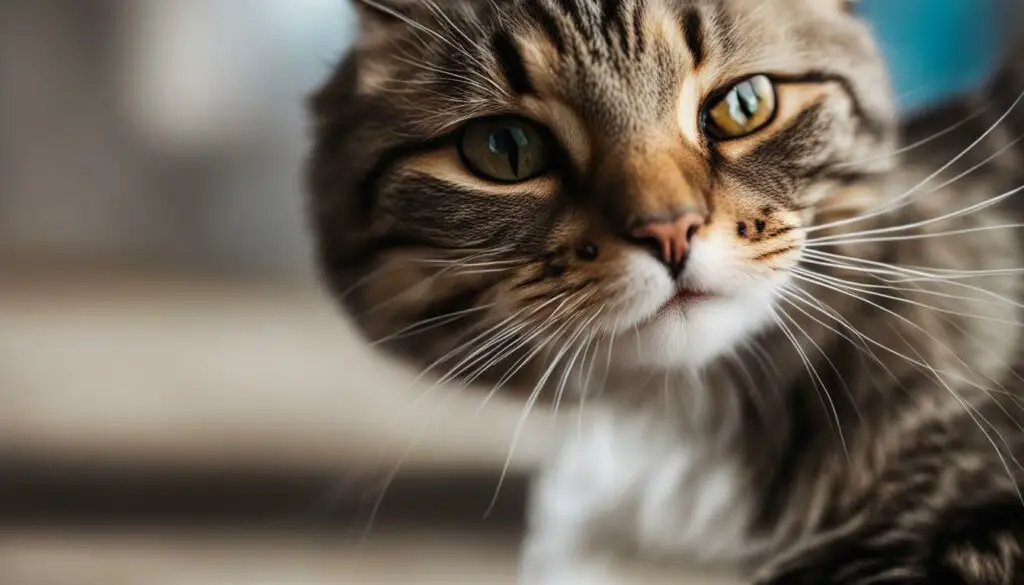
Remember, prevention is key. By maintaining good oral hygiene for your cat, you can help prevent the buildup of bacteria, reduce the risk of dental disease, and contribute to their overall health and well-being. Your veterinarian can provide guidance on the best oral care practices for your cat, ensuring they have fresh breath and a healthy mouth.
The Importance of Regular Veterinary Check-ups
Ensuring your cat’s overall health goes beyond just providing them with proper nutrition and regular grooming. Regular veterinary check-ups are essential for maintaining your cat’s oral health and preventing any potential dental issues that may be contributing to their fishy breath.
During a veterinary check-up, your veterinarian will perform a thorough oral examination to assess the condition of your cat’s teeth and gums. They will be able to detect any signs of dental disease or other oral health problems that may be causing your cat’s breath to smell like fish.
Additionally, your veterinarian can provide recommendations for dental hygiene practices tailored to your cat’s specific needs. They may suggest toothbrushing techniques, dental treats, or other alternative oral hygiene products that can help reduce plaque buildup and freshen your cat’s breath.
Regular veterinary check-ups not only ensure that your cat’s oral health is properly maintained but also help detect and address any underlying health concerns that may be contributing to their fishy breath. By prioritizing routine veterinary care, you can help your cat enjoy fresh breath and optimal dental health.
The Importance of Regular Veterinary Check-ups
| Veterinary Check-ups | Benefits |
|---|---|
| Thorough oral examination | Detect dental diseases and other oral health problems |
| Personalized recommendations | Provide dental hygiene practices tailored to your cat’s needs |
| Early detection | Address underlying health concerns |
| Preventive care | Maintain optimal oral health and fresh breath |
Regular veterinary check-ups play a crucial role in maintaining your cat’s oral health. By scheduling regular appointments with your veterinarian, you can address any dental issues and ensure your cat’s breath stays fresh and odor-free.
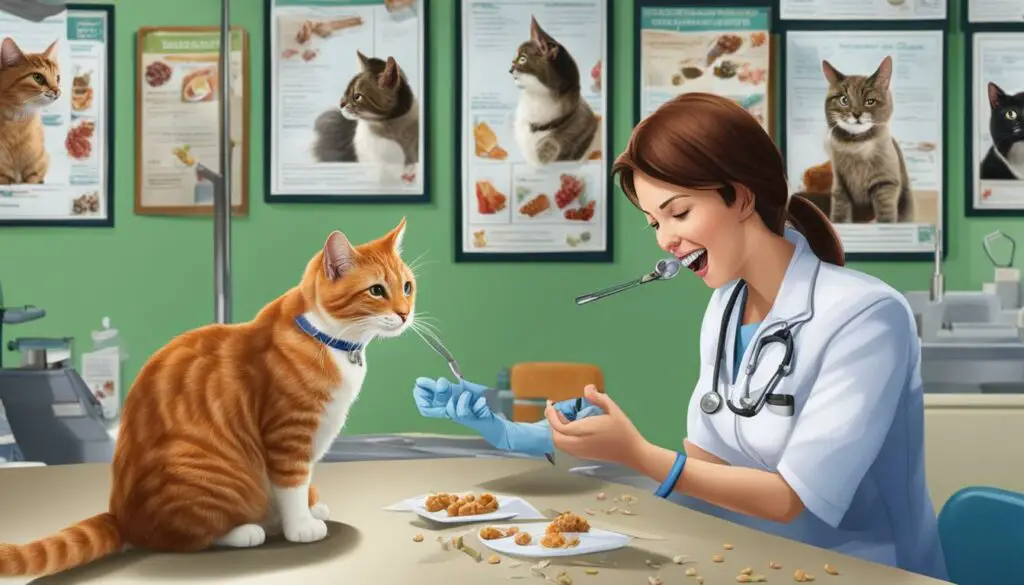
Frequently Asked Questions
- How often should I take my cat for a veterinary check-up?
- What are the signs of dental disease in cats?
- What dental hygiene practices are recommended for cats?
- Can dental issues in cats affect their overall health?
“Regular veterinary check-ups not only ensure that your cat’s oral health is properly maintained but also help detect and address any underlying health concerns that may be contributing to their fishy breath.”
Signs of Dental Disease in Cats
Recognizing the signs of dental disease in cats is essential for early intervention and proper treatment. Dental disease, also known as periodontal disease, is the most common cause of bad breath in felines. It progresses through different stages, starting with the buildup of plaque. Without proper attention, it can lead to the development of gingivitis, gum disease, and even impact overall health. By observing your cat’s behavior and dental condition, you can identify potential signs of dental disease.
Stages of Dental Disease:
| Stage | Description |
|---|---|
| Stage 1: Gingivitis | Red and inflamed gums, mild plaque accumulation |
| Stage 2: Early Periodontitis | Increased plaque, early signs of gum recession |
| Stage 3: Moderate Periodontitis | Persistent plaque, extensive gum recession, early tooth mobility |
| Stage 4: Advanced Periodontitis | Severe plaque and tartar, extensive gum recession, tooth loss |
In addition to the stages mentioned above, there are several signs that may indicate dental disease in cats. These include:
- Bad breath
- Red, swollen, or bleeding gums
- Difficulty eating or chewing
- Drooling
- Pawing at the mouth
- Loss of appetite
If you notice any of these signs or suspect dental disease, it is crucial to seek veterinary care promptly.
It is important to note that dental disease not only affects your cat’s oral health but can also have implications for their overall well-being. The bacteria associated with dental disease can enter the bloodstream and potentially contribute to other health problems, such as heart disease and kidney issues. By addressing dental disease early on, you can help maintain your cat’s oral health and minimize the risk of associated health complications.
The Importance of Regular Veterinary Check-ups
Regular veterinary check-ups play a crucial role in maintaining your cat’s oral health. During these visits, veterinarians can perform thorough oral examinations to identify any potential dental issues that may be causing your cat’s fishy breath. By addressing these issues early on, you can prevent further complications and ensure your cat’s overall well-being.
In addition to oral examinations, veterinarians can provide recommendations for dental hygiene practices tailored to your cat’s specific needs. They can offer guidance on proper toothbrushing techniques, recommend dental products such as toothpaste and brushes specifically designed for cats, and advise on appropriate dental diets or treats. These professional insights are invaluable in maintaining your cat’s dental health and preventing future problems.
Veterinarians can also perform dental cleanings to remove stubborn plaque and tartar buildup. These cleanings are typically done under anesthesia to ensure that the procedure is safe and effective. During the cleaning, veterinarians will thoroughly remove plaque and tartar from your cat’s teeth, addressing gum degradation and promoting optimal oral hygiene. By regularly scheduling these professional cleanings, you can help prevent dental issues and maintain fresh breath for your feline companion.
Benefits of Regular Veterinary Check-ups
- Early detection of dental issues
- Personalized recommendations for dental care
- Professional dental cleanings
- Prevention of future dental problems
Remember, your cat’s oral health is closely linked to their overall well-being. By prioritizing regular veterinary check-ups and following their recommendations for dental care, you can ensure that your cat enjoys a healthy mouth, fresh breath, and a happy, thriving life.
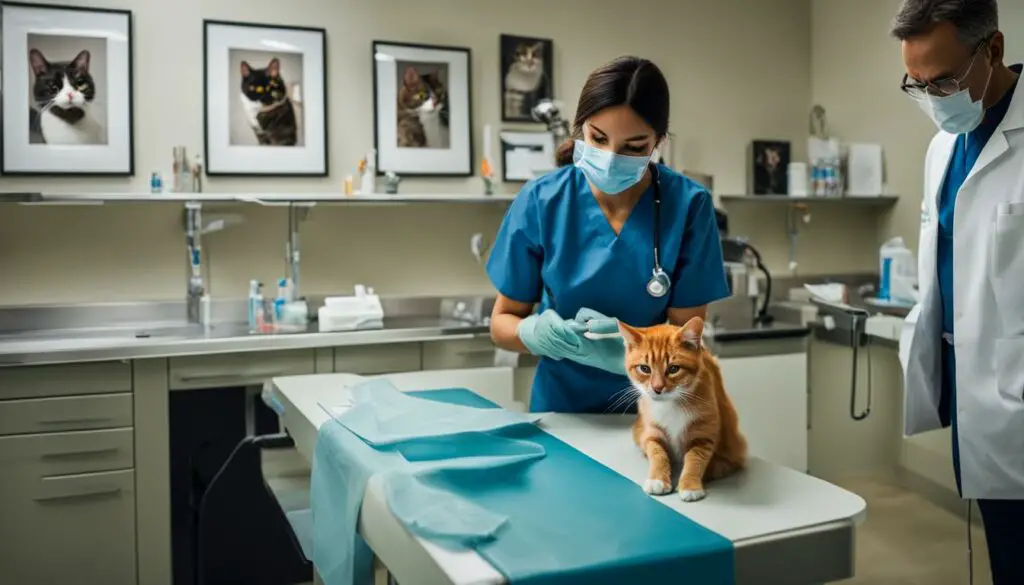
Alternative Oral Hygiene Products for Cats
When it comes to maintaining your cat’s oral hygiene, toothbrushing is not the only option. There are several alternative products available that can help reduce plaque buildup and contribute to fresher breath. Whether your cat is resistant to toothbrushing or you’re looking for additional ways to support their oral health, these alternatives can be beneficial:
Cat Dental Treats
Cat dental treats are specifically designed to promote oral health. These treats are formulated to help reduce plaque and tartar buildup, as well as freshen your cat’s breath. They often contain ingredients that help mechanically remove plaque from their teeth while providing a tasty snack.
Mouth Sprays
Mouth sprays for cats are an easy and convenient way to freshen their breath and support oral hygiene. These sprays typically contain ingredients that help combat bacteria in the mouth, reduce plaque formation, and neutralize odors. Simply spray the product into your cat’s mouth or add it to their water bowl as directed.
Water Additives
Water additives are another option for promoting your cat’s oral health. These additives are typically flavorless and can be easily added to your cat’s water bowl. They work by reducing plaque buildup, fighting bacteria, and freshening breath with every sip your cat takes.
It’s important to note that while alternative oral hygiene products can be beneficial, they are not a substitute for regular toothbrushing or professional dental care. Consulting with your veterinarian is always recommended to determine which options are most suitable for your cat’s specific needs. By incorporating these alternative products into your cat’s oral care routine, along with regular check-ups and toothbrushing, you can help keep their breath fresh and support their overall oral health.
| Product | Key Features |
|---|---|
| Cat Dental Treats | Reduces plaque and tartar buildup Freshens breath |
| Mouth Sprays | Combat bacteria in the mouth Reduces plaque formation Neutralizes odors |
| Water Additives | Reduces plaque buildup Fights bacteria Freshens breath |
The Role of Diet in Breath Odor
When it comes to your cat’s breath, the role of diet cannot be underestimated. What your cat eats directly affects the odor emanating from their mouth. Opting for a high-quality cat diet that is easily digestible and free from additives can help improve their gastrointestinal health and, consequently, their breath. A diet that supports good digestion can reduce the chances of your cat experiencing foul-smelling breath.

Incorporating wet food into your cat’s diet can also have a positive impact on their breath. Wet food helps increase hydration and prevents a dry mouth, which can contribute to fresher breath. Additionally, the moisture content in wet food can help flush out food particles that may get stuck between your cat’s teeth and contribute to bad breath.
It’s important to note that introducing any changes to your cat’s diet should be done gradually to prevent upset stomachs or other digestive issues. Consulting with your veterinarian about the best diet options for your cat’s specific needs is always recommended.
The Importance of Cat Dental Health and Oral Hygiene
Proper dental care is essential for maintaining your cat’s oral health and preventing issues such as bad breath. Cats are prone to dental problems, and their breath smelling like fish can be an indication of underlying dental issues. By understanding the importance of cat dental health and implementing proper oral hygiene practices, you can help your cat enjoy fresh breath and a healthy mouth.
Maintaining Good Oral Hygiene
Regular toothbrushing is one of the most effective ways to maintain your cat’s oral hygiene and prevent fishy breath. Use a cat toothbrush and toothpaste to clean their teeth at least twice a week. Start this habit early to get your cat used to the process. Additionally, providing your cat with dental treats or using mouth sprays and water additives specifically designed for oral hygiene can help reduce plaque buildup and contribute to fresher breath.
“Proper dental care is essential for maintaining your cat’s oral health and preventing issues such as bad breath.”
Professional Dental Cleanings
In some cases, professional dental cleanings may be necessary to address persistent fishy breath and underlying dental problems. Veterinarians can perform thorough dental cleanings, remove stubborn tartar buildup, and address gum degradation. These procedures are usually done under anesthesia to ensure maximum comfort and effectiveness. Regular veterinary check-ups and oral examinations are crucial for identifying dental issues and providing appropriate care.
The Role of Diet
Your cat’s diet can also affect their breath odor. Feeding them high-quality, easily digestible food without additives can promote gastrointestinal health and fresher breath. Incorporating wet food into their diet can increase hydration and prevent a dry mouth, reducing the risk of bad breath. Consult with your veterinarian to determine the best diet and feeding routine for your cat’s specific needs.
| Benefits of Cat Dental Health and Oral Hygiene | Actions to Take |
|---|---|
| Prevents bad breath | – Regular toothbrushing using cat toothbrush and toothpaste |
| Maintains oral health | – Provide dental treats or use mouth sprays and water additives |
| Prevents dental diseases | – Schedule regular professional dental cleanings |
| Ensures overall well-being | – Consult with a veterinarian for a balanced diet |
Conclusion
I hope this article has shed light on the reasons behind your cat’s fishy breath and provided valuable insights into how to fix it. Understanding the underlying causes, such as poor oral hygiene or dental disease, is essential for maintaining your cat’s dental health and overall well-being.
By implementing proper dental care practices, including regular toothbrushing, providing dental kibble or chews, and considering alternative oral hygiene products, you can help combat bad breath and reduce plaque buildup.
Remember, regular veterinary check-ups are crucial for your cat’s oral health. Veterinarians can perform oral examinations, address any existing dental issues, and provide recommendations for proper dental care.
By prioritizing your cat’s dental health and taking the necessary steps to ensure fresh breath, you can help your feline friend enjoy a long and happy life with a sweet-smelling mouth.
FAQ
Why does my cat’s breath smell like fish?
There are several reasons why your cat’s breath may smell like fish, including their diet, potential health problems, and grooming habits. Understanding these causes can help address the issue and maintain your cat’s oral health.
Can my cat’s diet affect their breath odor?
Yes, feeding your cat too much “human food” can lead to the buildup of tartar and dental plaque, causing bad breath. Being mindful of what you feed your cat can help prevent this issue.
Could my cat’s fishy breath be a sign of a health problem?
Yes, if your cat’s bad breath persists and has a strong fishy smell, it may indicate an underlying health condition like pharyngitis, gastritis, kidney failure, or mouth disease. It’s essential to consult with a veterinarian for proper diagnosis and treatment.
Why does my cat’s breath sometimes have a smoky smell?
Cats groom themselves extensively and clean their entire bodies, including their anal area. This behavior can result in a smoky smell when they open their mouths. Maintaining good overall cat hygiene is important for minimizing breath odor.
How can I combat my cat’s fishy breath?
Regular toothbrushing using a cat toothbrush and cat-safe toothpaste is one of the most effective ways to address bad breath. Additionally, providing dental kibble or chews and considering products like PlaqueOff can contribute to maintaining oral health and fresher breath.
Can professional dental care help with my cat’s breath odor?
Yes, if your cat’s breath odor persists despite your efforts, seeking professional dental care from a veterinarian can effectively remove stubborn tartar buildup. This can be the most efficient solution to address persistent fishy breath.
How important is my cat’s oral health for their overall well-being?
Proper oral hygiene is essential for maintaining your cat’s overall well-being. Neglecting their oral health can lead to the accumulation of bacteria, causing unpleasant breath and potentially contributing to other health problems.
Why are regular veterinary check-ups crucial for my cat’s oral health?
Regular veterinary check-ups allow for oral examinations and detection of potential issues. Veterinarians can provide recommendations for dental hygiene and address any underlying health concerns that may be contributing to your cat’s fishy breath.
What are the signs of dental disease in cats?
Dental disease, the most common cause of bad breath in cats, progresses through stages starting with plaque buildup. Recognizing signs like gingivitis, gum disease, and overall health implications is crucial for early intervention.
How can I prevent dental problems in my cat?
Regular dental cleanings, oral exams, and plaque removal, performed under anesthesia by a veterinarian, are recommended to prevent dental problems and maintain oral hygiene in cats.
Are there alternative products for maintaining my cat’s oral hygiene?
Yes, dental treats, mouth sprays, and water additives can help reduce plaque buildup and contribute to fresher breath. Consult with your veterinarian to determine which options are most suitable for your cat’s needs.
Can my cat’s diet affect their breath odor?
Yes, opting for high-quality, easily digestible food without additives can improve gastrointestinal health and contribute to fresher breath. Incorporating wet food into their diet can also increase hydration and prevent a dry mouth.
How can I fix my cat’s fishy breath?
By addressing the underlying causes of bad breath, implementing proper dental care practices, and providing regular dental check-ups, you can help your cat enjoy fresh breath and a healthy mouth.

